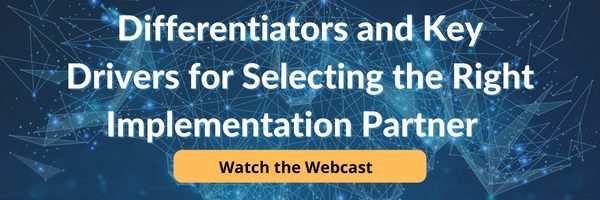- Len Riley
- Reading Time: 3 minutes

All too often we find ourselves engaged with prospective clients that decouple the negotiation of their SAP agreement from their System Implementation (SI) selection, evaluation and negotiation. Many organizations justify their strategies on a (i) compelling SAP value proposition, (ii) the opportunity to gain goodwill with SAP executives at a quarter-end, (iii) the desire to demonstrate momentum with their SAP program and/or (iv) not losing a budgeted capital appropriation.
Before de-coupling, consider these five tenets:
- Buy What You Need: Do you want to rely solely on SAP to identify the software purchase requirements necessary to meet your business case? Or would you prefer an SI validate the proposed SAP bill of material (BOM) before executing the SAP software agreement? Too often I have witnessed a client under- or over-purchase SAP software based solely on the perspective of SAP. During a recent SI selection process, two prospective partners of a client that already purchased SAP recommended a solution not included in the original SAP BOM. If your SI selection was run simultaneously with your SAP negotiation, this type of incongruence, and potentially unbudgeted purchase, would have been avoided.
- Define Your Cost: Do you prefer to set appropriate executive level expectations on total program cost? Do you want the scope of the SAP software licensed to align with the cost of the implementation? Do you want to have a sunk cost in SAP software before your management has an accurate view of program costs? Never have I seen the estimated cost of a program go down after engagement of an SI provider. In my experience, all parties, including internal project sponsors, are pressured to produce lower costs so the program can get off the ground. Aligning your SI costs with your ERP software costs will set more realistic expectations of your total project costs. Setting the up-front expectation may be hard, but realigning expectations downstream is certainly harder.
- Establish Roles: Do you prefer to understand the role of SAP, the SI partner and your organization holistically? Do you want to maintain leverage with SAP (via the software deal) and prospective SI’s in order to negotiate such roles and the associated contractual structures? SAP and its implementation partners walk a fine line of balancing how they approach the implementation. For example, in certain cases, the implementation partner will need SAP to supplement specific resources on the program, whereas SAP is incented to push multi-year MaxAttention services engagements. Based on firsthand experience, having the leverage of a pending SAP software transaction will cut through these issues quickly.
- Start the Meter: Do you want to start paying maintenance and/or cloud subscription fees for products before you even undertake the SI selection and negotiation process? Do you really know if SAP is presenting a value proposition that offsets commencement of associated operating expenses or could you get the same deal and mitigate your risk, regardless of timing? The reality is that SAP offers limited flexibility to defer commencement of maintenance fees or subscription fees. SAP will certainly offer financial incentives; however, they will ultimately leverage executive level relationships to execute an agreement in the timeframe they desire.
- Co-Innovation / Development: Do you prefer to know if the solution being proposed by SAP contains material gaps relative to your business requirements? Do you believe you know that your SI can address these gaps or is it more appropriate for you to co-develop or engage SAP’s Business Innovation Solutions group (aka custom development organization) to address these needs? Many of our most strategic clients have navigated these types of issues. The complexity associated with these arrangements creates difficulties between SAP departments (each with their own P&L and priorities) as well as SAP and its implementation partners (the SI will be reluctant to hold up an SAP software deal and proactively advocate for a gap assessment, unless of course it is driven by the customer).
Not all these considerations may be applicable to your situation, however, I would encourage you to evaluate the risk associated with each against the benefit of signing a deal with SAP too early. The loss of leverage with SAP and its SI partners falls off a cliff after the SAP software deal is signed – make sure you have a parachute before you decide to jump.
Comment below, follow me on Twitter @lpriley6, find my other UpperEdge blogs, and follow UpperEdge on Twitter and LinkedIn.

